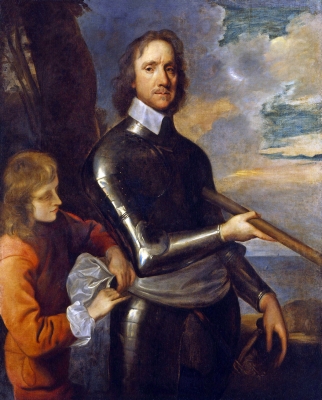
Lord Protector of the Common-wealth of England, Scotland and Ireland was the title assumed by Oliver Cromwell (1599-1658), the man who, above all others, brought about the downfall and execution of Charles I.
Cromwell was born at Huntingdon, the son of a Protestant family who had acquired lands at the time of the Reformation. When he was 29 he entered the House of Commons. Sir Philip Warwick gave this description of him at that time: His stature was of a good size; his sword close to his side; his countenance swollen and reddish; his voice sharp and untenable; and his eloquence full of fervour.” He proved an active and determined member, remarkable for his Puritan enthusiasm.
When civil war between Charles and Parliament broke out in 1642, Cromwell returned home and set about raising a well-disciplined cavalry regiment of “God-fearing men who became famous as the Ironsides and proved their worth in the defeat of Prince Rupert at the Battle of Marston Moor on July 2, 1644. A year later he was second-in-command at the decisive Battle of Naseby when the New Model Army, largely based on the principles of Cromwell’s Ironsides, crushed the royalist forces.
After Charles’s surrender Cromwell was the man chiefly responsible for the trial, condemnation and execution of the King. By his successful military campaigns against the Scots and the Irish, he forced them to submit to Parliament’s authority, but when Parliament quarrelled with the Army Cromwell dismissed it in 1653 and assumed the title of Lord Protector.
After Cromwell’s death in 1658, the title passed for a few months to his son Richard, a weak man powerless to resist the tide of reaction then setting in. In 1660 the Stuart dynasty was resorted in the person of Charles II. Cromwell’s remains were removed from West-minister Abbey, hung up in chains like the body of a common criminal and buried beneath the scaffold at Auburn.
Picture Credit : Google




